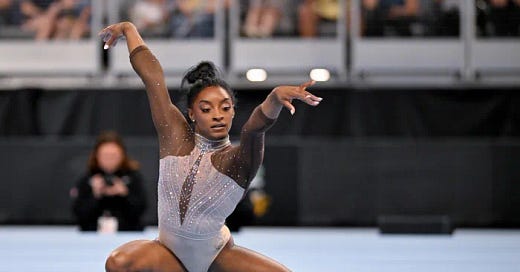The Olympics will come to a close today and, although I enjoyed watching the competitions, they didn’t feel quite so magical as they did in the past. Maybe it’s because we have too much choice in what to watch, or because it’s now only available as a paid streaming service on most TVs, so there isn’t the same energy around it as back in the day of the 3-channel public television. I feel a bit nostalgic for the 1990s when everyone rushed through dinner to catch the live event of the night.
Part of it, though, is a newfound aversion to competition. This is probably a byproduct of reading too much of the anthropological literature on hunter gatherers. Most hunter gatherer societies are highly egalitarian. In order to maintain equality and group cohesion, competition is shunned. Children’s games are notoriously non-competitive. For example, among the !Kung, children have a game where they attach feathers to stones, throw them into the air, and try to hit them with sticks. There is no counting and no comparison. Everyone competes against him or herself. Among adults, there is considerable variation in hunting skills, but this is actively checked by the community. Better hunters do not eat more meat than less capable hunters since everything is shared. If a good hunter starts thinking too highly of himself, he will be teased and belittled by the community. There is a strong cultural expectation that even the best (especially the best) must always show humility.
Contrast this to the attitudes of contemporary Olympic Athletes. In an interview with USA Today, Simone Biles said, “I’ve won five world titles and if I say, ‘I’m the best gymnast there is,’ (the reaction is) ‘Oh, she’s cocky. Look at her now.’ No, the facts are literally on the paper.” When Kim Mi Rae and her partner from DPR Korea won the silver in 10M Platform Synchro Diving, her only comment was “it should have been Gold.” American gymnast Jordan Chiles and Romanian gymnast Ana Barbosu have alternately been in tears as the bronze medal for the floor gymnastics routine has flip-flopped between them after a series of reviews. I get it. You work your whole life for that medal and it means a lot for your career whether you stand on the podium or not, but… isn’t it all just a little bit sick?
I have “suffered” my whole life from toxic competitive tendencies. I have always wanted to be the best. I was the runner-up for Valedictorian at my high school, accepted early to Stanford, then on to business school and a consulting career. Most of my professional experience has felt empty and unrewarding: long hours for a decent paycheck and fully devoid of meaning. When I think about how I used to lie awake all night as a 16-year-old stressing about a test the next day, I can’t help but think: was it worth it?
I don’t want my children to feel that kind of pressure. When they ask me to give them an “Olympic score” for their somersaults on the bed, I feel a little twinge of regret. It’s all fun and games for now, but one day, it won’t be. Competitive sports can be fun, but I don’t ever want them tying their self-worth to a trophy.





Amazing article and so true. We need to become more cooperative.